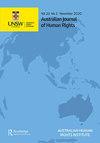Building human rights in the region through the role of horizontal transnational networks: the role of the Asia Pacific Forum of National Human Rights Institutions
Q1 Arts and Humanities
引用次数: 0
Abstract
ABSTRACT In 2007, Andrew Byrnes and Andrea Durbach received a grant from the Australian Research Council to investigate the role played by the Asia Pacific Forum of National Human Rights Institutions in promoting international human rights norms across the Asia Pacific. The project’s central question was whether, for the vast and heterogeneous Asia Pacific, a regional network of national human rights bodies might offer a more effective form of human rights governance than a supra-state regional human rights system. Fieldwork was carried out in every sub-region of the Asia Pacific: Fiji, Samoa, New Zealand, Thailand, Malaysia, Nepal, India, South Korea, Jordan and Palestine. A decade after the project’s conclusion, we analyse the project’s impact and influence. We conclude that the key intuition that drove the project forward, which was that strong and independent institutions within states are the most effective bulwarks against rights violations, remains as valid now as it was a decade ago. In a region that still lacks an overarching human rights institution, networks of national human rights institutions are an original and creative response to the challenges of human rights governance into the twenty-first century.通过横向跨国网络的作用在本区域建立人权:国家人权机构亚太论坛的作用
摘要2007年,Andrew Byrnes和Andrea Durbach获得了澳大利亚研究委员会的资助,以调查亚太国家人权机构论坛在亚太地区促进国际人权规范方面所发挥的作用。该项目的核心问题是,对于幅员辽阔、种类繁多的亚太地区来说,国家人权机构的区域网络是否可以提供比超国家区域人权系统更有效的人权治理形式。在亚太的每个次区域都进行了实地考察:斐济、萨摩亚、新西兰、泰国、马来西亚、尼泊尔、印度、韩国、约旦和巴勒斯坦。项目结束十年后,我们分析了项目的影响和影响。我们得出的结论是,推动该项目向前发展的关键直觉,即各州内部强大而独立的机构是防止侵犯权利的最有效堡垒,现在仍然和十年前一样有效。在一个仍然缺乏总体人权机构的地区,国家人权机构网络是对二十一世纪人权治理挑战的一种独创性和创造性的回应。
本文章由计算机程序翻译,如有差异,请以英文原文为准。
求助全文
约1分钟内获得全文
求助全文
来源期刊

Australian Journal of Human Rights
Arts and Humanities-History
CiteScore
1.30
自引率
0.00%
发文量
43
期刊介绍:
The Australian Journal of Human Rights (AJHR) is Australia’s first peer reviewed journal devoted exclusively to human rights development in Australia, the Asia-Pacific region and internationally. The journal aims to raise awareness of human rights issues in Australia and the Asia-Pacific region by providing a forum for scholarship and discussion. The AJHR examines legal aspects of human rights, along with associated philosophical, historical, economic and political considerations, across a range of issues, including aboriginal ownership of land, racial discrimination and vilification, human rights in the criminal justice system, children’s rights, homelessness, immigration, asylum and detention, corporate accountability, disability standards and free speech.
 求助内容:
求助内容: 应助结果提醒方式:
应助结果提醒方式:


